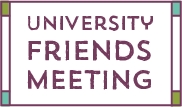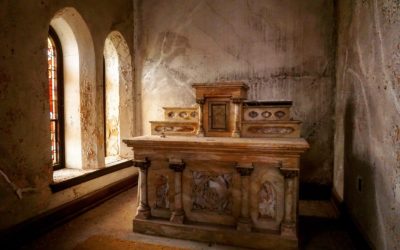- Scripture – John 4:23-24
- Music – Wes Miller
- Flowers – Beth McDonald
- Stewardship Moment – Michelle Barrett
Good morning, and happy Father’s Day! I am glad you joined us for worship this morning.
Thank you to Beth McDonald for the flowers and Wes Miller for the music.
- If you have announcement or prayer requests, please feel free to add them as comments on the Facebook page.
Announcements
- We are live streaming on Facebook and not gathering at the church for worship, at least through July 5. We are talking about reopening, but that won’t happen on Fourth of July weekend.
- During the live streaming, we do have room for a few people to come and serve as a kind of facing bench. If you would like to be among those who worship with us in person, be sure and let the office know.
- Also, please feel free to share our worship with your Facebook friends by posting a link on your page.
- Among church activities this week
- Monthly Meeting for worship with a concern for business meets via Zoom at 1:00 this afternoon. The link and the agenda were in the This Week email sent out on Friday. We’ve got some important things to talk about.
- The 205 Sunday School class is gathering on Zoom this afternoon at 3:00.
- Tuesday, June 23, at 10:00 a.m. is the memorial service for Valerie Guilliams at Resthaven. The family is inviting people to gather for lunch and visiting afterward. See details in The Light This Week.
- The Worship Committee will meet at 4:30 on Tuesday.
- The Book Club will meet at 6:30 on Tuesday, in the church library with a Zoom option. We will be discussing chapters 3-6 in Phil Gulley’s book, For Everything a Season. Please let me know if you’d like to join via Zoom.
- Our church is hosting Family Promise the week of June 28. It will be “shelter in place,” as we did last time, so we are providing meals only. Last time I checked we still need someone to contribute meals on Friday and Saturday, July 3 and 4. If you would like to help, please contact Erin DeGroot or visit the sign-up list on Facebook: University Friends Family Promise.
Stewardship Moment: Michelle Barrett
Prayer concerns
- The family of Valerie Guilliams as they prepare for the memorial service, marking her death this week
- Dan Schuster is still having some health problems and is scheduled for a brain MRI and another test this Friday, June 26.
- Greg Newby has had been having extreme dips in his blood pressure with a low heart rate. After seeing a cardiologist this past week, he is making some adjustments in his medications.
- Gordon Smith has been scheduled to go home from the care center today. I know Joan would appreciate our continued prayers.
- Cliff Loesch had neck surgery on Friday. Word is that the surgery went well. Cliff is in the hospital for a few more days and faces several weeks of recovery.
- Our congregation is in transition and coping with a pandemic. Let’s pray together for greater clarity on God’s call for our future.
- Justice
Prayer
God, the source of life and health, we open our hearts and minds to you this morning.
On this Father’s Day, we ask you to bless the fathers among us.
- May they find more and more ways to be good fathers to their children.
- We give thanks for the ways our fathers have been blessings to us.
- We pray for those who have less than perfect relationships with our fathers. May we find ways to open our lives to your healing.
- We pray for those fathers who know they have fallen short of the ideal. May they find ways to receive your love and give it to their children.
- We pray for those whose fathers are gone, especially for those whose dads have recently passed. I think especially of my friend Kristyn, whose father died a week ago today.
We know you are with us in our time of transition and into the future. Grant us wisdom and courage to listen to you and to each other and obedience to your call as way opens.
Message
Last week, I completed the series of messages on the Quaker testimonies. I have talked about simplicity, peace, integrity, community, equality, and three types of stewardship – stewardship of the earth, of time, and of money.
Today, I’m going to continue talking about Quaker perspectives, and I envision a few messages coming up such as a Quaker view of the church and a Quaker view of worship. Today’s message is about a Quaker view of the sacraments.
In Wilmer Cooper’s A Living Faith, he begins his chapter “Quakers and the Sacraments” with this sentence:
If non-Quakers know anything about this ‘peculiar sect,’ as some would call Friends, they probably know about their Peace Testimony, their use of silence in worship, and their testimony against the use of sacraments (p. 87).
First, what is a sacrament? One online dictionary says a sacrament is “a religious ceremony or ritual regarded as imparting divine grace.” A sacrament is, according to Augustine, a visible sign of an invisible reality (Cooper, 88). We might think of a sacrament as a window to God, something in our world that brings God’s presence, God’s love and grace to us.
Since the twelfth century, the Roman Catholic Church has recognized seven sacraments: baptism, the Eucharist (or communion), confirmation, reconciliation (or confession), anointing of the sick (formerly last rites), marriage, and ordination.
In the sixteenth century, Martin Luther’s questioning of the Catholic Church included a rethinking of sacraments. Luther said that sacraments are religious rituals that have both a divine promise and a sign (my dissertation, p. 155). Based on that perspective, Luther said only two Christian rituals meet the qualifications: baptism and communion. Most Protestant denominations have followed Luther’s teaching on sacraments and recognize only those two.
So, do Quakers have a testimony against the use of sacraments? Well, yes and no.
Cooper says as much:
… Friends believe in and practice the baptism of the Holy Spirit as well as holy (spiritual) communion in their worship. What they don’t believe in is the efficacy of the outward elements – the use of bread, wine, and water in sacramental ceremonies of worship. Instead, Friends have formulated a sacramental theology that focuses on the ‘real Presence’ in the act of worship (p. 87).
So, if Quakers had a testimony against the use of sacraments, that testimony would say we don’t practice the sacraments. But we do practice sacraments — baptism without water and communion without bread or wine.
Quakers notice Matthew 3:11, where John the Baptist says, “I baptize you with[b] water for repentance, but one who is more powerful than I is coming after me; I am not worthy to carry his sandals. He will baptize you with[c] the Holy Spirit and fire.” (NRSV)
Quakers notice the words of Ephesians 4:4-5, “one lord, one faith, one baptism.” Our tradition holds that “one baptism” doesn’t mean either sprinkling or pouring or immersion. It means entering into Christ’s life and death and becoming a new person. For reals. That’s the goal: to allow God’s Spirit to do real work within us.
Quakers notice that first-century Christians broke bread together – they ate meals together, not so much a religious ritual of bread and wine as real sharing of real food.
In the nineteenth century, when orthodox Quakers were laying out how they differed other Friends, they came up with what is now known as the Richmond Declaration of Faith, 1887:
Worship is the adoring response of the heart and mind to the influence of the Spirit of God. It stands neither in forms nor in the formal disuse of forms: it may be without words as well as with them, but it must be in spirit and in truth. (John 4:24) We recognize the value of silence, not as an end, but as a means toward the attainment of the end; a silence, not of listlessness or of vacant musing, but of holy expectation before the Lord. Having become His adopted children through faith in the Lord Jesus Christ, it is our privilege to meet together and unite in the worship of Almighty God, to wait upon Him for the renewal of our strength, for communion one with another, for the edification of believers in the exercise of various spiritual gifts, and for the declaration of the glad tidings of salvation to the unconverted who may gather with us.
The idea of worshiping God in spirit and in truth comes from Jesus’s conversation with the Samaritan woman who came to get water and found Jesus. If the story were set in the U.S. today, this woman might have been African American or Latina or Native American.
Talking with Jesus, she asked a theological question (John 4:20ff, NRSV).
20 Our ancestors worshiped on this mountain, but you[c] say that the place where people must worship is in Jerusalem.”
21 Jesus said to her, “Woman, believe me, the hour is coming when you will worship [God] neither on this mountain nor in Jerusalem. 22 You worship what you do not know; we worship what we know, for salvation is from the Jews. 23 But the hour is coming, and is now here, when the true worshipers will worship [God] in spirit and truth…. 24 God is spirit, and those who worship [God] must worship in spirit and truth.”
The Message puts it this way:
“It’s who you are and the way you live that count before God. Your worship must engage your spirit in the pursuit of truth. That’s the kind of people the [God] is out looking for: those who are simply and honestly themselves … in their worship. God is sheer being itself—Spirit. Those who worship [God] must do it out of their very being, their spirits, their true selves….”
For reals.
I do note that we Quakers can suffer from a certain lack of humility when we think we get sacraments right, so we’re better than everyone else. If humility is a clear sense of our strengths and our weaknesses, we need to recognize that sometimes we do benefit from having something physical as a window to God.
Listen to Elton Trueblood in A People Called Quakers, as he begins his chapter on sacraments.
Sometimes when people who have only a little knowledge of Quakers are asked how Quakers are distinguished, it is answered that they are the peculiar Christians who do not observe the sacraments. … It would be nearer the truth to say that Quakers are distinguished by the intensity with which they accept the idea that ours is a sacramental universe (p. 128).
Both Cooper and Trueblood note that people think Quakers don’t practice the sacraments. Cooper said we practice them, but we practice them spiritually, without bread and wine or water. Here, Trueblood says we find the opening to God in a zillion ways through bread and wine, and through water but also through the natural world — sunshine and rain, mountains and oceans, flowers and trees, frolicking baby goats, stolid bison. We find openings to God in the cat that keeps
us company and the dog who welcomes us home. We find openings to God through babies and children, through friendships, through family. To the extent that our fathers have been signs of God’s love, our fathers have been openings to God for us. We find openings to God in shared laughter and shared tears, through play and work and sex. (Yes, you heard me right.) In those moments when we meet one another at the deepest levels, that’s when we are most real. That’s when we experience through other people a window to God.
Years ago, I was going through a difficult time. I was facing the reality that my marriage was coming to an end. I went for a walk in the woods near a river, walking along a paved path, pondering and praying. I noticed a small white flower growing out of a crack in the pavement. The plant was about 4 inches tall, all by itself, and it was beautiful. That flower, that day, brought God’s love to me.
What things, what people have brought God to you this past week? What real thing will God do among us today? Where might we find openings to God in the future?
Please join me as we enter a time of open worship, communion after the manner of Friends. If you feel led to contribute, please do so via comments on the Facebook page.




0 Comments